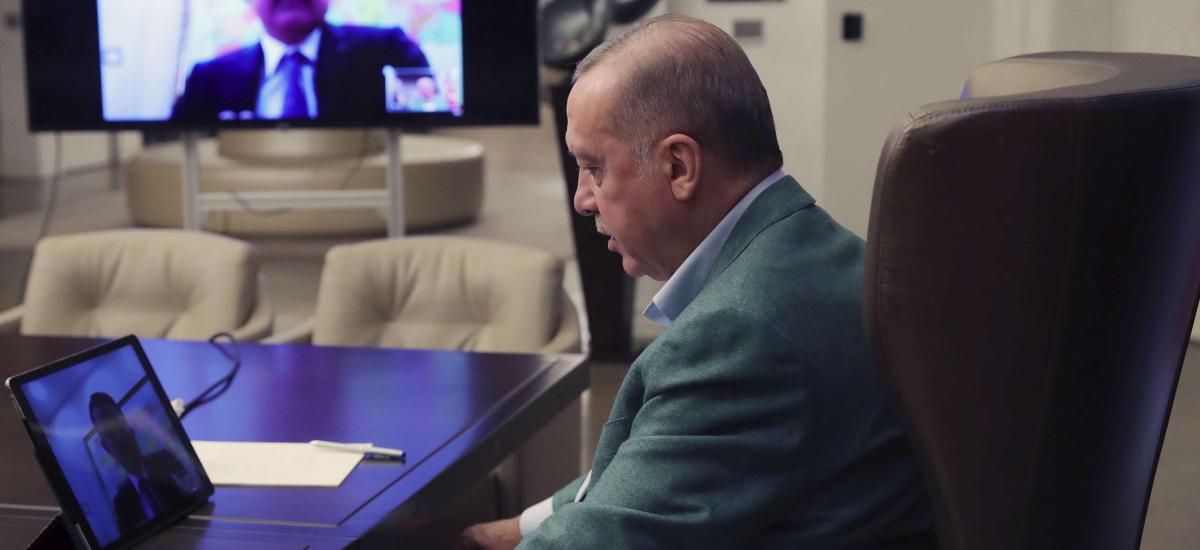Turkey, like many countries, faces the double challenge of slowing the rapid spread of the coronavirus and avoiding the near collapse of its economy. Turkish President Recep Tayyip Erdoğan is now facing the greatest challenge of his career from an enemy against which the political acumen and ability to pivot that he usually relies on will count for little or nothing.
Erdoğan has been styled by some as a new sultan, but the rate of coronavirus infections cannot be slowed by Erdoğan’s classic “divide-and-rule” tactic used so deftly to dominate his domestic political opponents. Nor will the virus respond to the radical re-direction of Turkish foreign policy away from the west to a neo-Ottoman quest for regional pre-eminence. Instead, Erdoğan must do something that does not come naturally to him: defer to the experts.
In part, Erdoğan needs to learn from the actions of his American counterpart. Initially, United States President Donald Trump was unconvinced of the seriousness of the outbreak. Although he did move in January to restrict the travel of people from China, where the outbreak emerged, to the United States – it was already too late to prevent the spread of COVID-19 to the country, as the virus had already likely spread far beyond China by that point.
Also, in his typical fashion, Trump at first placed himself at the forefront of the efforts to slow the spread of the disease, casting himself as fully knowledgeable of how to deal with an outbreak that he had long played down.
But the rapid spread of the virus has forced Trump to defer to the experts. Instead of presenting himself as the all-knowing expert, Trump now presents himself more frequently as the coordinator-in-chief; reserving the right to make final decisions on a course of action, but making it obvious to all that he is following the wise and experienced voices of medical and public health experts.
Erdoğan must also position himself as a supreme coordinator, one who listens to wise counsel and then sees that a course of action is implemented. If he decides to follow this approach, Erdoğan enjoys certain political advantages.
Unlike in the United States, Erdoğan does not have to worry about an independent press pointing out his initial missteps and remarking on their consequences. He also can count on the cooperation of the legislature, not having to negotiate and compromise with them as Trump had to. He also has no worries about the judiciary stepping in to thwart the implementation of his decisions – which for Trump, even during this crisis, must always be borne in mind. Unlike Trump, Erdoğan does not have to worry about the impact of errors in policy implementation affecting his imminent electoral chances – he will not face the voters in a few months unless he chooses to do so.
But Erdoğan also faces a few comparative disadvantages. First, it is out of character for him to accede to the advice of subordinates if it contradicts his inclinations. Erdoğan has shown this tendency most often in foreign policy, with predictably poor outcomes regarding Syria, hydrocarbons in the Eastern Mediterranean, refugee policy vis-à-vis the EU, and general relations with the West.
Second, Erdoğan does not have reliable, apolitical experts comparable to the talented experts that Trump has come to realise he must listen to if he hopes to save American lives, protect the economy, and preserve his chances of re-election.
Third, while the structure of U.S. political governance excludes many authorities from Trump’s control, it also enables him to spread the blame for the poor implementation of expert-endorsed decisions by the federal government which he leads and the 50 state governments over which he exercises limited authority. In contrast, Erdoğan leads a unitary form of governance and the blame for any failures will be laid at his door.
Can Erdoğan set aside his ego and his need to control in order to listen to the wise counsel of medical and public health experts? Most importantly, can he resist the temptation to use this crisis as a pretext to clamp down on dissent and civil liberties as he did in the aftermath of the failed July 2016 coup attempt? Will he call all Turks to join together across political, sectarian, and ethnic divisions to combat the threat from the coronavirus, or will he divide the Turkish people during the crisis through politically expedient xenophobia and hostility?
If he can muster the right combination of deference to the expertise of others with forthright unifying messaging, he can inspire the nation. If, however, he ignores medical experts, or exacerbates divisions in Turkey for political ends, he risks further diminishing Turkey’s standing in the world, while hindering its efforts to defeat the coronavirus at home.
Perhaps then it is not exactly the virus itself that constitutes Erdoğan’s greatest challenge, but whether he can tackle it by transcending his usual way of confronting a threat.
http://ahval.co/en-79724




